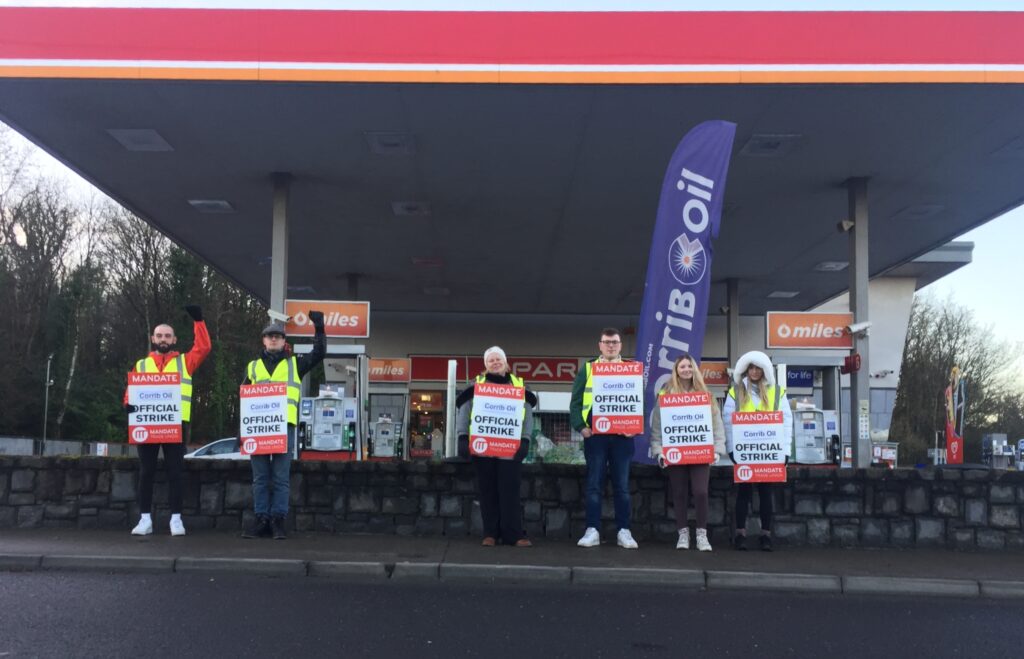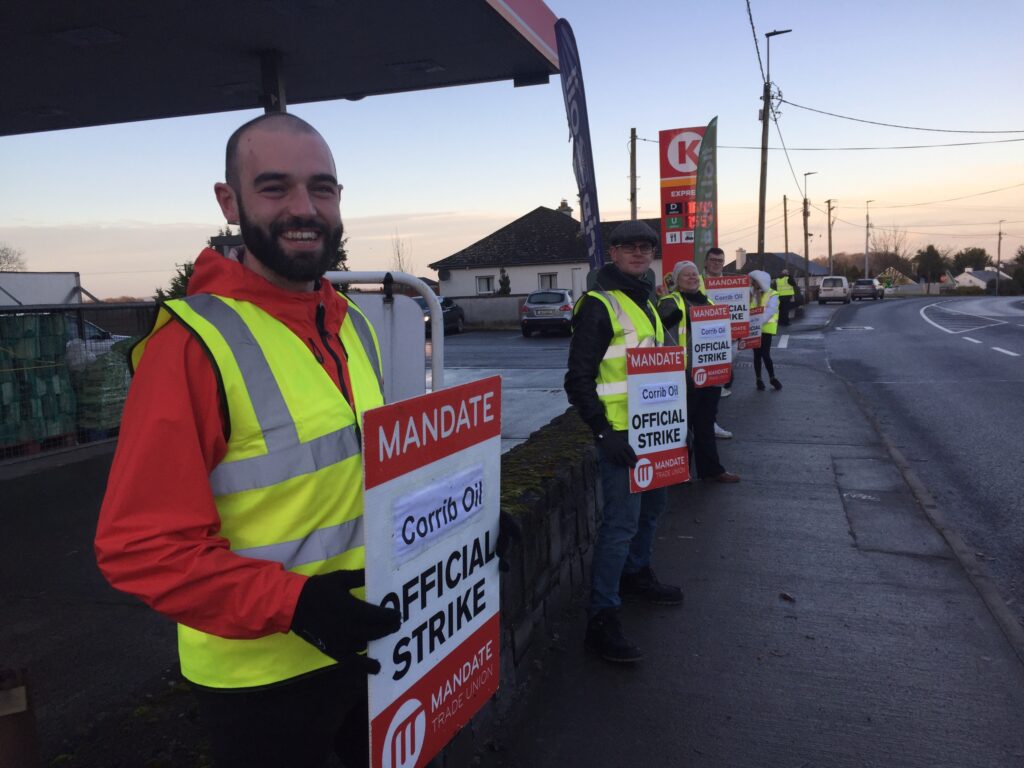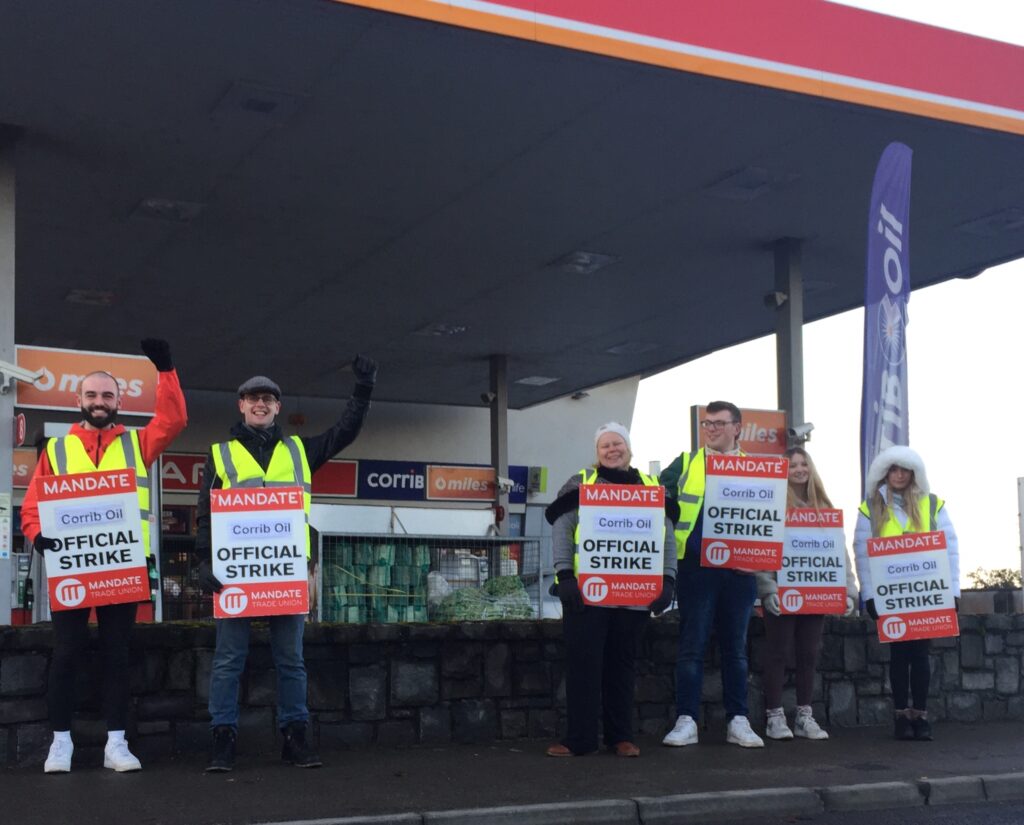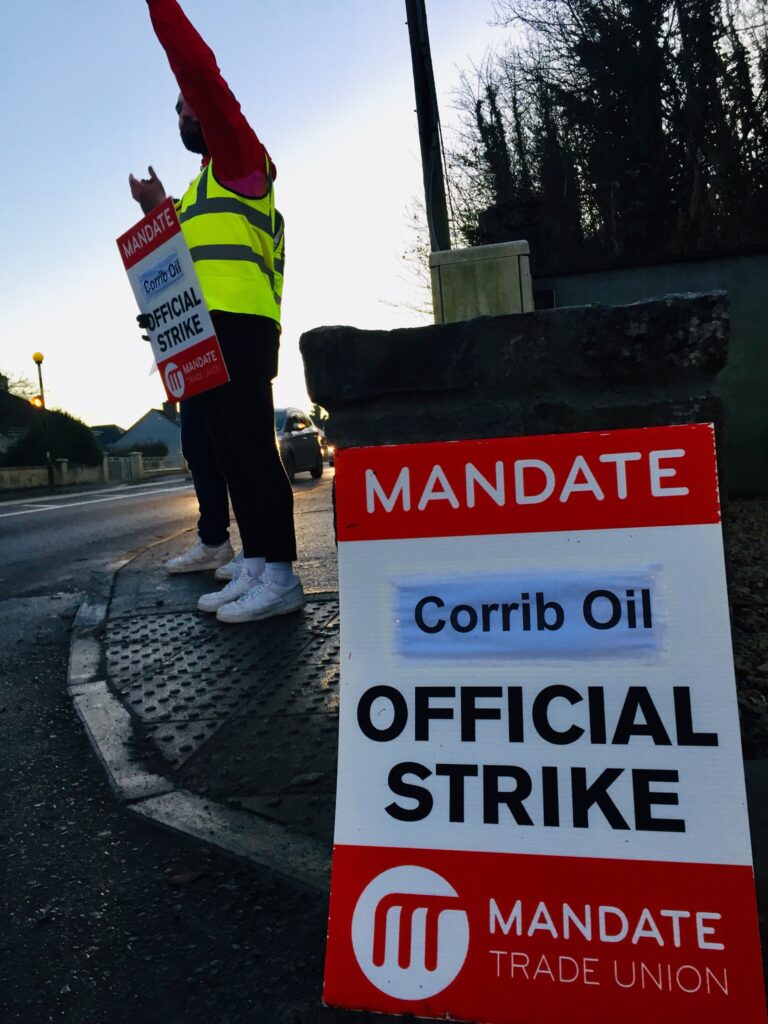There were six picketers in front of the Corrib Oil petrol station in Ballinasloe. It was a sunny Thursday afternoon just after the darkest night of the year. It was 3 days before Christmas.
‘The last strike Ballinasloe I saw? It was at the hospital a few years ago I think,’ Oisín said over the sound of drivers honking out their constant stream of support.
THE PICKET
Oisín and Elina, Jack and Andrew, Maya and Megan had taken over the picket at around 11am. People Before Profit came by to show support and a few minutes later we were joined by another union member, Jakub, who had been on the first part of the rota. He spun by in his car to check in on the rest of his Corrib Oil workplace union. Jakub had been on the lead section of the rota: 6am to 11am. The strike was planned to continue until 10pm. This group was halfway through the long centre part: 11am to 5pm. Spirits were high.
Corrib Oil’s young staff are mostly in their 20s. None had been on strike before. Most had never been in a union before. For some, this was their first job. Others like Elina had lived abroad, worked in retail, and had run her own business. Some were in nominal supervisor positions.
Andrew has been working at the station for six years and was now in a supervisor role. ‘(Taking a supervisor role) is really the only way to get an increase in pay.’ He was unhappy with the flat pay scale and lack of benefits and silence over the cost of living crisis impacting everyone, something people working in fuel saw coming before most. So he got advice and started talking to a few different trade unions. Eventually he chose to build a workplace union under Mandate and started ‘a union drive’ talking with each member of staff to ask them about what matters to them and how union would help.
He’s got more involved in the union’s training. He is now on the Mandate Youth Committee, but the focus remains on winning in the workplace with his co-workers. It’s all been organised face-to-face, not through online materials or print. Members talk to new workers, co-workers, and each other about the issues and the union. Andrew said talking with Mandate’s officials, including John Carty the Western Division Organiser who was on site coordinating the action today, has been really helpful.
‘You in People Before Profit have been the only ones down here so far’ John observed. James Halligan, from Mandate’s Youth Committee, was proud to be representing the support Mandate’s thousands of members around the country sent. And according to Maya, Megan, and Oisín the public were the biggest source of support. They supplied teas and coffees and snacks throughout the day.
But by far the biggest encouragement were the moments when the usual customers turning into the forecourt slowly realised that this was a picket line. They paused and proudly smiled in solidarty or soberly nodded, turned off the indicators, raised a hand in support or honked their horn, and continued on.
Cheers from the picket always followed.
The workers said that the station was definitely seeing lower numbers and there were petrol stations less than 500 meters up and down the road past the hospital into town. They knew their strike was getting the town’s attention, and their boss’s too.
‘It feels good to be in the union because you have someone to guide you when it comes to your rights.’ And they noticed that the bosses started paying attention to them once the letters about recognition started coming in and the notice of strike action came through last Friday.
‘We had our first staff meeting- ever. They asked stuff like “What can we be doing better?”‘
ISSUES
‘Anytime we need something,’ Andrew says, ‘you’re on your hands and knees begging them. There isn’t even a payscale.’
It seems that the employment model like many in hospitality and retail is based around an expectation – or maybe even an encouragement – of employee ‘churn’.

‘If I stayed on for 6 years and never became supervisor or assistant manager, I’d still probably be on 11 euro even after years of service… when we take on someone new as a replacement, the managers train the new person in at no cost. And in fairness that gets kicked down to the staff when teaching about closing procedures etc… That’s an extra responsibility and no extra pay.’
There’s some tech-based remote ‘Food Safety’ and ‘Health and Safety’ training to meet obligations but for site specific training is inevitably handled by staff.
The matching pension contributions are not being taken up by younger and ‘student’ staff who are struggling to get by and pay the basics.
Is there training pay? No.
Sick pay? No.
Has there been a pay increase for the cost of living? No.
‘This dispute is really about trade union recognition. We need to get a formal agreement so that the union can formally negotiate. Everything else follows,’ John Carty said.
The final part of the picket rota was going to run from 5-10pm, but Corrib Oil closed at 6pm. Maybe this was due to the overwhelming public support the people of Ballinasloe showed for people mounting a direct fightback, but more likely it was down to the shortage of workers where 90% had joined their workplace union’s picket and were making a difference for each other not just their boss. After months of appeals for recognition they were on strike to make their workplace a more democratic one.

CONTEXT
This may be the only strike for union recognition in the south this year. It’s certainly the first in the south to be recognised on StrikeMap.org.
In the north, we have seen 15 days of strike action at Royal Mail alone; three full days of strike action by NHS workers affecting the entire health system this month, 999 workers joined in with the BT Openreach strike… There have been 19 weeks (16 consecutive weeks) of strike action from NI Housing Executive workers. But all of these are large employments which cover the whole of the north already have ‘always had’ union recognition through simple adherence to basic democracy through the UK’s law (if 50% of staff plus 1 are in the union, the employer must formally agree to deal with and negotiate with that union).
In the south, the only way to get formal recognition is through a ‘voluntary agreement’ by the employer. But these agreements are not being signed up to very often. Business owners don’t want to ‘voluntarily agree’ to workplace democracy. They bet that workers can’t unionise and won’t strike.
But things are shifting. Younger workers are more and more favourable to unions and are seeing fewer and fewer benefits to being the boss’s best girls and boys… especially in low-paid retail and hospitality roles. The cost of living and housing crises make it absolutely clear: the boss’s way is not the best way. Workers need their own voice at work. But you have to fight for that voice to be heard sometimes. And you can’t win that fight alone.
IMPACT
When’s the next day of strike action? Will this action spread? ‘That’s all down to Corrib.’ says Andrew as an ambulance passing by sounds its siren in support.
‘They are now saying they want “meaningful discussions”. We were looking for that months ago. And we told them that in the meetings: “We want you to recognise the union and procedural agreement to be hashed out…” If they want to, they can stop these kinds of actions from happening again by putting a procedural agreement in place… It’s up to them now really.’
People Before Profit supports the workers.













